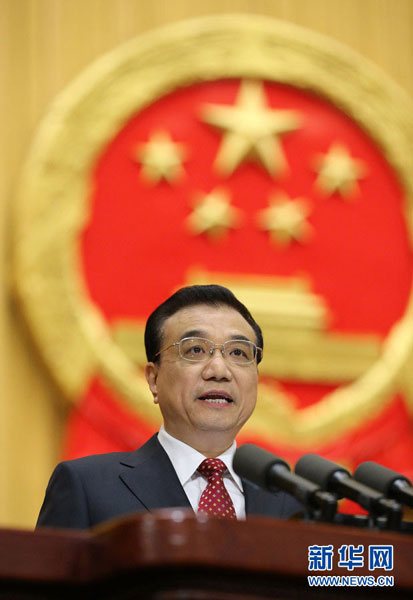 时刻新闻
时刻新闻

By Shafei Moiz Hali
Photo: Xinhua
China is kicking off its parliament session; it is like the super bowl, the nucleus of China’s political calendar. The all important meeting is taking place in Beijing's Great Hall of the People where, some 3,000 delegates come together to caucus the country’s affairs and finalize China’s new year plan. The session is scheduled to conclude on March 16.
Before the proceedings began for the opening session of China's annual legislature a flag raising ceremony took place at the historic Tiananmen Square, large sums of people poured in to witness the ceremony.
Once the delegates were seated after the national anthem Premier Li Keqiang took the stage to deliver the much awaited government work report. The Premier stated that it is "a difficult battle" especially when the world is exhibiting sluggish economic growth but China being a major driver of the world economy is ready and steadfast in dealing with the challenges. The Premier started off with a review of the previous year, he talked about the challenges as to how the Government is planning on using the Challenges as opportunities to move towards the new economic growth model.
Premier Li Keqiang's annual work report revealed that the economic growth target has been set at 6.5-7 percent for this year. The target is roughly close to a growth of a trillion dollars for the year 2016 and also the average annual growth rate for the next five years is set at above 6.5 percent which means growth of a trillion or more every year for the next five years which is a healthy sign of forecasting stability.
The major areas highlighted in the Premier’s speech are not just buzz words but actual reforms and policies which will be formally finalized during the annual meeting of the legislature. The major areas are; Growth, Innovation-Driven Development, Modern Industries, Internet, Energy Revolution, Urbanization, Maritime Power, Environment, Opening-up, Belt &Road Initiative, Global Economic Governance, International Responsibility, People’s well-being and Strategy and Security.
The first point highlighted by the Premier accounts for “economic growth” and 2016 marks the starting point of China’s 13th Five-Year Plan till 2020 and by the end of this five year plan it is forecasted that China will eventually have a strong domestic consumer base which will not only mean stable economic growth but also a prosperous China; as by 2020, the 2010 GDP and the GDP per capita income will be doubled through innovative, coordinated, green, open, and shared development.
China has been striving really hard in recent years by investing heavily in research and development to steer China’s path for growth towards “innovation-driven development” this is why this point is an integral part of the new five year plan. The Premier stated that in the 13th five year plan special emphasis will be given to “breakthroughs in core technologies including information communication, new energy, new materials, aviation, biological medicine and intelligent manufacturing.” China will try and forcefully initiate international major science projects, indulge in advanced research. Policies will be set to ease the criteria for foreign talents’ applying for permanent residence.
The process of curbing waste production started last year and in the next five years will focus on “modern industries” which will support the initiative of “Made in China 2025.” Premier Li said, "Innovation is the primary driving force for development and must occupy a central place in China's development strategy." That is why key areas of focus will involve information technology, new energy, biological technology and low-carbon industries, as well as high-end equipment and materials. Li said, "We will promote greater user of Chinese equipment, technology, standards, and services in the international market, and help Chinese manufacturing brands gain international recognition."
The Premier stressed the importance of “internet” during his speech and during the next five years, China’s internet revolution will go through a phase of metamorphosis through which it will be one of the major drivers of the new economy of China. Focus will be given to; “Speed up building a new generation of information infrastructure, Advance 5G telecom technology, Implementation of ‘Internet Plus’, Promotion of big data and social governance innovation.”
In today’s world the energy is a hot topic and in the coming five years China will endeavor to bring about an “energy revolution” “by establishing a modern clean energy system and by building a coordinated and integrated energy network” and in the process lowering carbon emissions at a drastic level.
China’s Challenges also include “urbanization” and until 2020 the government will take measures to accelerate urbanizing rural migrants and will take key steps to build world-class city clusters in Beijing-Tianjin-Hebei region, Yangtze River Delta and Pearl River Delta.
China’s massive trade volumes over the seas demand “maritime power” and to develop this, China needs to strengthen maritime law enforcement, safeguard maritime interests, maintain free navigation and maritime passage safety, improve sea-related dialogue and cooperation mechanisms with neighboring countries to boost pragmatic maritime cooperation.
As highlighted during the energy revolution point, “environment” is going to be a major policy matter for the 13th five year plan. For coal consumption the target is to keep annual energy consumption within five billion tons. A strict environmental protection regime will be set to improve the environment, Control carbon emissions, honor climate commitments and deeply participate into global climate governance. Premier Li said, "Over the next five years, we should aim to ensure that water consumption, energy consumption, and carbon dioxide emissions per unit of GDP are cut by 23 percent, 15 percent, and 18 percent, respectively, and that forest coverage reaches 23.04 percent."
As part of China’s ongoing endeavors of “opening up the coming five years will also experience China’s further opening up to boost trade, expand international production capacity cooperation in sectors including steel, railway, telecommunications, machinery and aviation. It is forecasted that the service trade’s share in total foreign trade will see a spike of 16 percent. Premier Li said, "We must make consistent efforts to encourage the public to start businesses and make innovations." As part of the strategy of a more open China, restrictions will be relaxed in the service sector for foreign capital. The previous year paved the way for widening the market access on the securities and banking sector and in this five year plan it will be further expanded upon. Foreign investment will be welcomed to flow into advanced manufacturing, high-tech industries and energy saving sectors.
Special efforts will be made to further China’s win-win strategy to build new bilateral agreements with nations and mechanisms will be set for the Yuan’s convertibility to promote its global use and access.
“Belt and Road” initiative will be one of the prime objectives. Measures will be taken to speedup the work and to open up the landscape. The government will aim to boost cooperation with international financial institutions, while bolstering the Asian Infrastructure Investment Bank and the BRICS New Development Bank; consequentially improving operations for the Silk Road Fund. All these measures will put the work on a fast track.
China aims to be a responsible player with in the “global economic governance” system and will try to safeguard the role of the World Trade Organization and push forward multilateral trade negotiations. Within the ambit of the Belt and Road initiative China will actively set up free trade areas with partner countries. Free Trade Agreements for creating an environment of win-win will be followed through and Li said, "We wish to actively negotiate and sign the Regional Comprehensive Economic Partnership agreement. We will help speed up negotiations on the establishment of the China-Japan-ROK free trade zone. We will work to make progress in negotiations on investment agreements between China and the United States and between China and the European Union."
China will actively participate in the making of international rules on the Internet, deep sea, polar region and space and of international standards.
China prides itself in-terms of “international responsibility” and with the 13th five year plan coming in to affect, it will Increase assistance to developing countries in education, medicine, disaster relief, animal protection and poverty alleviation. China will work with the international community to ensure international public security and will oppose any forms of terrorism.
Just like the goals which were set in the 12th five year plan for the “people’s well-being” through which China was able to uplift millions of people from poverty, this endeavor will continue in the 13th five year plan with renewed zeal as the new target is to lift 50 million people out of poverty and build a moderately prosperous society in all aspects. China will fully implement the two-child policy, with the total population reaching 1.42 billion.
China will equip its self to meet the challenges of “Strategy and security” whether they may be in the sphere of politics, territory, economy, society, terrorism, resources or the internet. The defense spending will see an increase of 7-8% in 2016 and during the next five years China will set policies which will see it poised for advancing its national defense and military modernization plans.
After reviewing the aims of the 13th five year plan of China it seems China is ready to sail through these challenging times when the world economy is growing at its slowest pace. it seems China will remain as the growth engine for the world and the coming five years will witness some of the red ribbons being cut on the projects of the belt and road initiative which will not only make China strong but the fruit of this initiative will be shared by all.
The Author: Shafei Moiz Hali has a master’s degree from George Mason University, Virginia, USA in the field of International Commerce and Public Policy. Mr. Hali has been working as an Assistant Professor at the National Defence University (NDU), Islamabad, Pakistan with the department of Government and Public Policy Since 2009. Currently he is pursuing his PhD from the College of Public Administration at the Huazhong University of Science and Technology (HUST), China.



